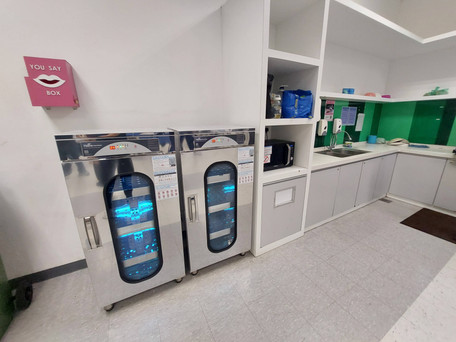Corporate Initiatives Towards Zero Waste Sustainability - Ultraviolet Sterilisers at the Workplace (MUFG Bank Singapore & Hewlett-Packard Manufacturing Malaysia)
- News & Articles

- Jul 29, 2024
- 3 min read
Updated: Jul 26, 2025

In recent years, a growing number of corporations have recognised the importance of addressing environmental concerns within their operations. One significant aspect of this endeavor is their commitment to achieving zero waste sustainability in the workplace.
This concept involves minimising waste generation, maximising recycling and reuse, and ultimately striving to send zero waste to landfills. Corporate initiatives aimed at achieving zero waste sustainability are multi-faceted, encompassing various strategies and practices across different industries.
++++++++++
Waste Management
One common approach taken by corporations is the implementation of comprehensive waste management programs. These programs often involve the establishment of waste reduction targets, the adoption of recycling and composting initiatives and the promotion of waste segregation practices among employees.
Through these efforts, companies seek to minimise the amount of waste generated within their premises and divert as much waste as possible from landfills.

++++++++++
Another key aspect of corporate initiatives towards zero waste sustainability is the promotion of sustainable procurement practices. Many companies are increasingly prioritising the procurement of environmentally friendly products and materials that are either biodegradable, recyclable, or made from recycled content.
By sourcing sustainable alternatives, corporations aim to reduce the environmental impact associated with their procurement activities and contribute to the circular economy.

In addition, corporate efforts towards zero waste sustainability often involve engaging employees through education and awareness campaigns.
These initiatives aim to foster a culture of sustainability within the workplace, encouraging employees to adopt environmentally responsible behaviors such as reducing paper usage, minimizing food waste, and properly disposing of recyclable materials.
Employee engagement has been recognised as a critical factor in the success of zero waste initiatives, as it relies on the collective efforts of all individuals within the organisation.
++++++++++
Adoption of innovative technological solutions to reduce waste
Technology also plays a significant role in corporate efforts towards zero waste sustainability. Many companies are investing in innovative solutions such as waste tracking software, smart bins, and composting systems to better manage their waste streams.
These technologies enable companies to monitor waste generation in real-time, identify areas for improvement, and optimize their waste management processes for greater efficiency.

Additionally, some corporations have adopted innovative solutions such as ultraviolet sterilisers in their pantries to further reduce paper product waste and promote zero waste initiatives.
These sterilisers utilise ultraviolet light to disinfect and sanitise reusable utensils, cups, and dishes, eliminating the need for single-use paper products such as disposable plates and cutlery.
By implementing such technologies, companies not only minimise their environmental footprint by reducing paper waste but also encourage employees to embrace sustainable practices in their daily routines.
The integration of ultraviolet sterilisers underscores the diverse approaches that corporations are exploring to achieve their zero waste goals while prioritizing hygiene and efficiency in the workplace.
++++++++++
Our most recent installations at MUFG Bank Singapore and Hewlett-Packard Malaysia illustrates how more and more organisations are committed to moving towards a more environmentally friendly, zero waste stance to reach their sustainability goals.
MUFG Bank Singapore
Corporate initiatives towards zero waste sustainability often extend beyond the confines of the workplace to encompass broader community and industry collaborations.
Many companies actively participate in partnerships with local governments, non-profit organizations, and other stakeholders to promote waste reduction and recycling efforts on a larger scale. By working together with external partners, corporations can leverage collective expertise and resources to address systemic challenges and drive meaningful change.
Hewlett-Packard Malaysia
++++++++++
While significant progress has been made in recent years, achieving zero waste sustainability remains a complex and ongoing endeavor for many corporations. Challenges such as changing consumer behaviors, inadequate infrastructure, and limited market demand for recycled materials continue to pose obstacles to progress in this area.
Nevertheless, corporate commitment to sustainability and the pursuit of zero waste goals signal a positive shift towards more environmentally conscious business practices.

++++++++++
In conclusion, corporate initiatives towards zero waste sustainability in the workplace represent a proactive response to environmental challenges and a commitment to responsible business conduct.
Through a combination of waste management programs, sustainable procurement practices, employee engagement efforts, technological innovations, and collaborative partnerships, corporations are working towards the ambitious goal of minimizing waste generation and maximizing resource efficiency.
While the path to zero waste may be challenging, the collective efforts of businesses, employees, and stakeholders offer hope for a more sustainable future.
.png)





























Comments